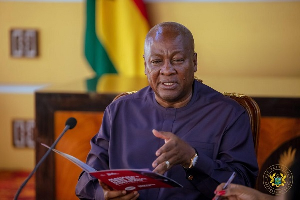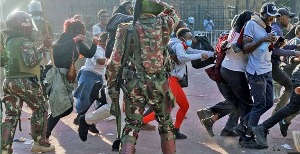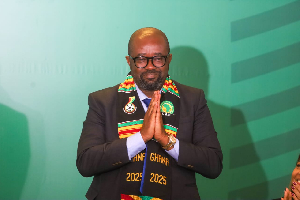Accra, Ghana -- On a balmy Sunday evening in the capital of Ghana, 15 people wait in line at the city's best ice cream shop. Except for me, all hail from this West African country. Ice cream isn't standard fare in the tropics, and four scoops of Italian-style at Frankie's cost $1.10.
That's not much for a visiting American to pay, but then I earn about $5, 000 a month, or five times the pay of a successful physician here and more than 100 times the salary of a policeman. Frankie's is a short walk from the house I rent, and whenever I visit I wonder who are the Ghanaians who can afford to pay for ice cream?
After all, Ghana's annual per capita income is a paltry $500 a person, or about 50 times less than in the United States.
Food prices are soaring. A small bag of rice, almost certainly imported, costs as much as a Frankie's four-scoop. So does a large yam, a staple of the Ghanaian diet that is grown just 30 miles away in the countryside. Housing costs are rising, too, at least as much as the country's official inflation rate of 25 percent. Even the price of Frankie's ice cream rose by half over the summer.
Ghana is so poor -- and the government so deeply in debt -- that foreign lenders recently agreed to wipe out billions of dollars in loans, saving the country hundreds of millions a year in interest payments. The government remains so broke that earlier this year, when it decided to fire thousands of state workers who were collecting money but not showing up for work, it needed a grant from Japan of $775,000 simply to launch the exercise. The government has so little cash it has delayed introduction of higher-denomination bills -- printed in a European country because of the type of paper and security features required -- until it can afford to pay for them.
Ghana is so poor that it lacks even one decent road between Accra and regional commercial centers. Without its own highway money, the government has taken to begging foreign governments for the funds.
And there are many indications that ordinary people are growing poorer. A friend of mine, who takes care of primates at the Accra Zoo, earns the equivalent of $31.50 a month. Evance works six days a week and has not received a raise in several years. Inflation has ruined his salary, which three years ago was respectable, worth the equivalent of $100 a month. On Aug. 1, the cost of electricity, which is only sold by the government, rose by 60 percent; another increase is planned at the end of the year. Water rates are rising similarly.
School for Evance's three children is technically free, but various required fees make the cost more than $20 a child per term. Evance continually wonders whether it is worth sending his daughter to school (no such worries about his sons). The high cost of housing -- and the entrenched practice of requiring tenants to pay the entire rent for the full term, as much as three years, in advance -- means that Evance must live far away from the center of Accra, where the zoo is, and commute for three hours a day. He travels in a series of crowded vans, called "tros tros," that lack air-conditioning.
Evance is the typical wage-earner in Accra, where the legal minimum wage is 90 cents -- and that's for a day, not an hour. Yet the ice cream gets dished out at Frankie's every night until 11 p.m. So what gives?
To begin to understand the relationship of wealth and poverty in Ghana -- and, by extension, in sub-Saharan Africa, where many of the world's poorest people live -- consider a conversation I overheard here about a year ago. A consultant from Britain was advising doctors and administrators of the Ghana Health Service on how to shift more health-care services to the poor. The consultant insisted that too much care was going to wealthy people. The Ghanaians shifted uneasily in their seats, uncomfortable with the thought. Then an official in the health ministry raised his voice. "Wealthy people?" he asked. "Aren't we all poor in Ghana?"
Indeed, wealth is relative. In recent weeks, a leading newspaper, the Accra Mail, has repeatedly reported that a senior journalist in the country accepted a $125,000 bribe as a favor to a politician. Though the newspaper hasn't explained the circumstances of the payment or even presented a short list of possible recipients, the reports have caused an uproar here.
But not for the obvious reason. Bribery of the press is widespread here, but what has so many journalists and public officials chattering is that they think $125,000 is not enough money to sway a journalist. "Maybe two or three times that amount would work, but who would sell themselves so cheap?" one prominent journalist told me.
Part of the problem with defining wealth in Africa is that it is extremely costly to maintain a Western lifestyle here. Ghana is a scarcity economy, meaning that things like hot water and a backup generator (to ensure electricity) are fancy extras. Locally grown, high-quality marijuana can be had for pennies, but expect to pay through the nose for dental floss. A flood of images from the United States and Europe, meanwhile, has made the lives of the wealthy look downright ordinary. To those who can't afford to surf the Web or watch foreign videos, there is always local television. One station airs CNN nightly, advertisements included.
The pursuit of the good life, as defined by Europeans and Americans, means that Ghanaians hunger to move abroad. At the city's busiest Internet cafe, the owner tells me that two-thirds of his customers surf the Web in search of a way out -- of Ghana. The U.S. Embassy here this month raised to $100 the fee paid merely to apply for a visa (and the fee isn't refunded if you are turned down). The embassy says the price reflects the costs of processing Ghanaian requests but the indelible impression left is that the United States is trying to discourage Ghanaians from applying. No conversation with a talented person here ever ends before he or she asks my advice on getting into the United States. Ghanaian parents openly talk about how they hope one of their children can somehow "make it" to the United States or Europe and thus provide a permanent safety net for the rest of the family.
There are an estimated 1 million Ghanaians living outside of their home country, with at least 100,000 in Britain and perhaps as many in the United States. These people, many of whom shuttle back and forth between Ghana and their jobs in the West, pump an estimated $500 million into the country's economy, or roughly the same amount of money the government raises each year from local taxes.
Scratch a customer eating ice cream at Frankie's and he or she is likely to live outside of Ghana part of the year -- or to be related to someone who does.
For people earning money outside of Ghana, and bringing it in, these are better times. Ghana's currency, the cedi, has lost 15 percent of its value against the dollar this year, and fetches only one quarter of what it did three years ago. The fall in the cedi fuels inflation, because Ghana imports more than it exports, and gives people here a further incentive to earn money in dollars, which in turn raises the benefit of leaving home. To be sure, many people want to live in Ghana, no matter the cost.
And some people do benefit from the sort of economic liberalization and gradual relaxation of government control over the economy that began in Ghana in the 1990s. In the past decade, liberalization occurred around the world, of course, under the rubric of "globalization," and the balance sheet, as the world economy limps along and stocks remain at depressed levels, is difficult to tally. As elsewhere, globalization has produced winners. In Ghana, these are people who program computers, trade in commodities, maintain a private medical practice or earn a university degree that is internationally recognized. Mobile telephony, to cite one major opening, has transformed communications in a country whose national wired telephone network is awful. But to my eye, the losers from liberalization outnumber the winners in Ghana and even the winners here, perversely, think they have lost.
Maybe they are right. At Frankie's, the line for ice cream is shorter than it used to be.














